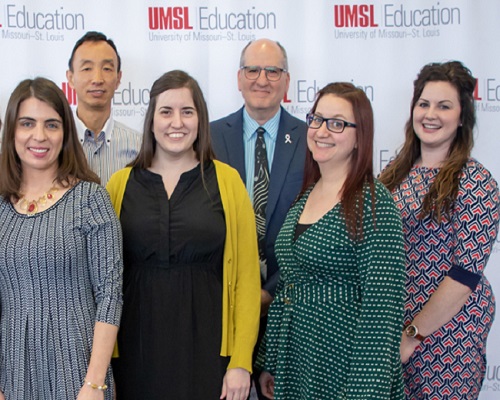Make a greater impact with a master’s degree in education
Elevate your skills and help transform lives with a Master of Education in one of five emphasis areas from the University of Missouri–St. Louis.
At UMSL, we believe in empowering educators. Our education master’s program is built on a foundation of respect and recognition for your experience and expertise. Choose from a diverse range of specializations, tailoring your studies to your unique passions and goals while amplifying your existing skillset.
Along with advanced coursework in your chosen specialization, you’ll engage in action research within your own classroom or educational work setting. Our MEd program will prepare you to identify problems of practice, collect and analyze data to improve student learning outcomes, and develop effective curricula.
You’ll also explore practice learning theory and pedagogy, while deepening your understanding of educational technology and educational administration.
Tailor your MEd education to your career goals
The Master of Education degree has five emphasis areas:
- Curriculum and Instruction: Learn to develop cutting-edge curricula and design innovative instruction for diverse learners.
- Early Childhood Education: Advance your skills for early childhood education job opportunities in public and private programs.
- Interdisciplinary Studies: Design a master’s degree in education experience around your areas of interest.
- Reading: Further your competencies as a teacher of reading, writing and other communication arts.
- Teaching English to Speakers of Other Languages (TESOL): Apply knowledge about language learning to culturally and linguistically diverse classrooms.
Program type:
Graduate, MEd
Format:
On-Campus, 100% Online
Take the next step
Request more information below:

Why earn your master’s degree in education at UMSL?
The UMSL College of Education shapes the educational landscape in the St. Louis region, advances educator quality in Missouri and is nationally recognized as a leader in research and innovation:
- Known for quality. Our Master of Education is accredited by the Association for Advancing Quality in Educator Preparation and the Missouri Department of Elementary and Secondary Education.
- Flexible program. Take classes online or in person, full- or part-time, to meet your needs. You can finish your master’s degree in education in as little as two years.
- Expert faculty. Our education master’s program faculty are recognized experts in their field who bring a wealth of experience to the classroom. They’re dedicated to ensuring you have what you need to get the most out of your M.Ed. education.
- Strong alumni network. UMSL has prepared more than 20,000 educators for service — more than any other university in the region.
What can you do with a master’s degree in education?
Our education master’s program equips you with the knowledge and skills to break barriers and build better classrooms. Dive deep into cutting-edge education practices, master evidence-based strategies and gain hands-on experience in real classrooms.
With a master’s degree in education from UMSL, you’ll become a transformative educator, prepared to:
- Continuously reflect on your practice, using data and feedback to drive continuous improvement and maximize student learning.
- Harness the power of technology to create engaging, personalized learning experiences that prepare students for success in a globalized world.
- Master advanced content and pedagogical knowledge, enabling you to design authentic, deep learning experiences that spark curiosity and critical thinking.
- Become an expert in curriculum development, utilizing learning science principles to design, implement and evaluate effective programs aligned with rigorous standards.
- Build strong relationships with students, colleagues, families and community members, fostering a supportive environment where every student thrives.
- Create a classroom that celebrates diversity and inclusion, so learners feel empowered to reach their full potential.
- Utilize equitable frameworks and inclusive practices, ensuring all students have access to high-quality instruction and assessment, regardless of background or ability.
62,360
1
Career Opportunities
- Elementary School Teacher
- Secondary School Teacher
- Department Chair
- Curriculum Developer
- Textbook Editor
- Educational Consultant
- Tutor
- Educational Program Planner
- Informal Learning Specialist
- International Education Specialist
Admissions requirements include an earned baccalaureate degree from an accredited college or university with an overall grade point average of 3.0 or higher, a completed UMSL Graduate School Application, official transcripts from all colleges and universities attended and two letters of recommendation.
Application Deadlines
Fall - July 1, Spring - December 1, Summer - May 1
Download Program RequirementsPlan of study
Curriculum and Instruction Emphasis
Review Full Degree RequirementsEarly Childhood Emphasis
Review Full Degree RequirementsInterdisciplinary Studies
Review Full Degree RequirementsReading Emphasis
Review Full Degree RequirementsTeaching English to Speakers of Other Languages (TESOL) Emphasis
Review Full Degree Requirements
Non-Missouri Residents: Prospective students are responsible for reviewing the NC-SARA state authorizations page to see if this program is offered in their state throughout their program and to review the licensure or certification requirements for the state in which they reside.
Student Organizations - Make new friends and learn new skills by joining one of our Recognized Student Organizations.
Career Services – Students have access to professional career counselors who can assist in everything from resume development and interview preparation to lining up an internship or connecting you with your next fulltime career. UMSL alumni also enjoy high quality, lifelong career management programming, services, events and resources to assist in all phases of career development.
Networking – with the largest alumni network in the region, UMSL graduate students have access to leading professionals engaged in business, research, entrepreneurship, non-profit, government, community organizations. Our academic units engage this network in curriculum development to ensure our graduate students gain the skills needed to advance along their choose career path.
Research – There are many opportunities for graduate students to showcase their research including our annual Graduate Research Fair, which is open to students from all graduate programs. Doctoral and thesis master’s students can also compete in the Three Minute Thesis challenge to be evaluated by a panel of judges for a chance to win cash prizes.








